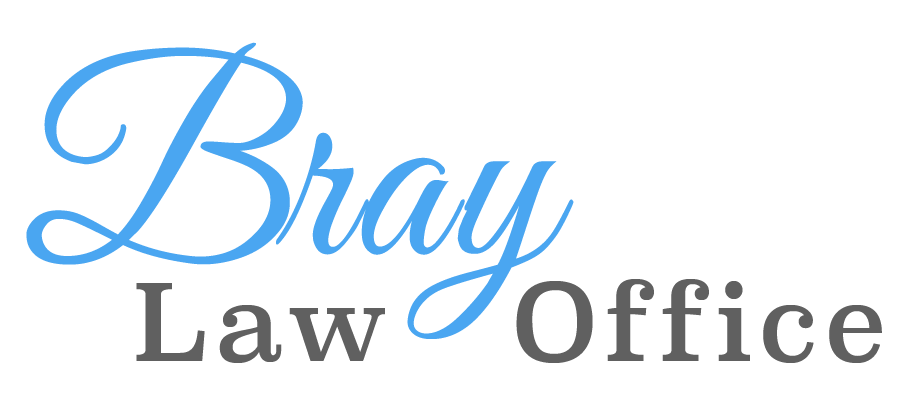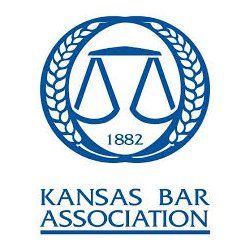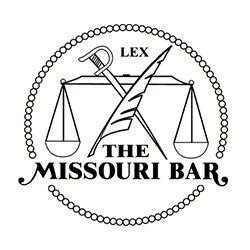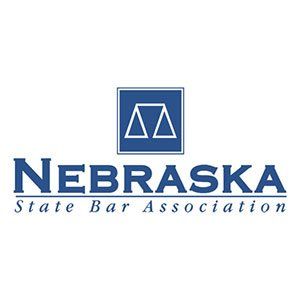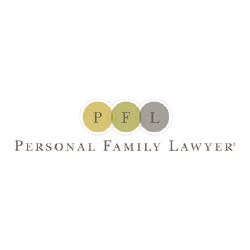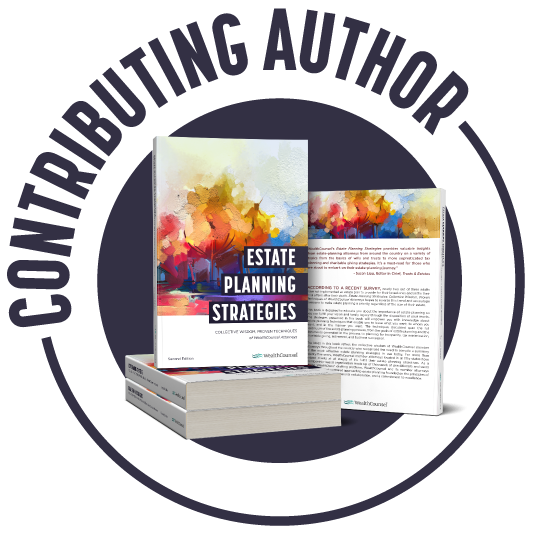Blog

For many people, the term estate planning brings to mind stacks of legal documents, a will, a trust, a healthcare directive, or powers of attorney. But estate planning isn’t just about creating documents. It’s about making sure the people you love are protected and supported when they need it most. It's ultimately about love, protection, and peace of mind. Yet despite that truth, most people are unprepared. A survey from 2024 showed that only 32% of Americans have a will, a 6% decline from the previous year. That means most families are at risk of court involvement, conflict, and unnecessary costs at the very moment they are grieving. In this article, you’ll learn why estate planning is one of the most important steps you can take for everyone you love. You’ll discover what happens when families don’t plan, how to create a plan that works, and why now is the perfect time to put your plan in place. What Most People Miss: Estate Planning Is About People, Not Paperwork The most common misconception we hear is that drafting a set of documents and signing them is how to create an estate plan. This misconception exists because it’s the traditional way estate planning has been done, and most people don’t know how insufficient documents alone are until they’re left dealing with a big legal and financial mess after a loved one has died. But you can avoid leaving a mess for those you love if you create a well-designed plan that goes beyond the paperwork. A well-designed, complete plan makes life easier for all the people you love. It ensures they have the clarity, authority, and support they’ll need when something happens to you. Imagine your loved ones trying to manage your affairs without knowing where your accounts are, how your bills get paid, or who should make medical decisions for you if you can’t speak for yourself. Without clarity and support, they could face months of confusion, stress, and court involvement. But with a proper plan in place, they’ll know exactly what to do and whom to turn to so they can focus on what really matters: caring for each other. A well-designed estate plan doesn’t just pass on your assets. It passes on your values, your guidance, and your love. You will record the stories you want remembered, the traditions you hope will continue, and the lessons you’ve learned that you want your loved ones to carry forward. These are the true treasures your loved ones will cherish most. When you see planning this way, it becomes clear that it’s not something you do for yourself. It’s something you do for them. As important as it is to understand what estate planning truly represents, it’s equally important to recognize the consequences of neglecting it. What Happens When You Don’t Plan Another misconception we hear is that people think they don’t have enough assets to warrant planning. This also isn’t true. Since estate planning is ultimately about people, you need a plan if you have anyone in your life whom you love. No matter the size of someone’s estate, every lawyer who helps families after a death has seen it: the heartbreak that happens when planning was ignored, outdated, or incomplete. People who never created a plan, or have an incomplete or failed plan, create a situation where their loved ones face long delays, expense, and family strife. Assets are frozen. Bills go unpaid. Grieving children are left to guess at their parents’ wishes, and often disagree about what those wishes were. Even simple omissions can lead to lost property, family disputes, or thousands of dollars in unnecessary legal fees. And then there’s another danger: the illusion of planning. Many people think they’ve completed their estate plan because they used an online form or had a lawyer prepare documents years ago. But if those documents don’t reflect current laws, assets, or relationships, they can fail completely when they’re needed most. And when plans fail, the result isn’t just financial, it’s emotional. Loved ones who were once close may end up with irretrievably broken relationships. Precious time and energy are spent untangling confusion instead of being spent together in comfort and healing. Estate planning isn’t a one-time task, but an ongoing act of care. The good news is that with the right guidance, your plan can protect your loved ones for life. How to Create a Plan That Truly Works Our planning process results in a well-designed, well-thought-out plan that works when you and your loved ones need it. It’s not documents-focused, it’s people-focused. Life & Legacy Planning is a comprehensive process designed to protect both your loved ones’ future and their peace of mind. When you work with us, your plan begins with a Life & Legacy Planning Session, a working meeting that helps you understand exactly what would happen to your family and each of your particular assets if something happened to you now. During your session, you’ll gain clarity about your current situation and make informed choices about what’s truly best for the people you love. We’ll review your goals, relationships, assets, and values, then create a plan that ensures everything and everyone you care about will be protected exactly the way you intend. Importantly, a Life & Legacy Plan is a living system, not a static set of papers. It includes an up-to-date inventory of your assets, clear instructions for your loved ones, and a built-in process for regular reviews as your life, the law, and your assets change. It’s a relationship-based approach that ensures your plan stays current and that your loved ones always have us as someone to turn to for help when they need it most. By combining proactive legal planning with ongoing support, we help you avoid the very pitfalls that leave most families struggling after a loved one’s death. The result is confidence, not just that your documents are complete, but that everyone you love will be guided by someone who knows you, your wishes, and your story. When you understand how powerful real planning can be, the next step becomes clear: act before it’s too late. Your Next Step Happens Now Take the step that too many people put off entirely, or put off until it’s too late. If you already have a plan, let’s make sure it’s up to date and truly reflects your life today. If you don’t, now is the perfect time to begin. We can help you create a Life & Legacy Plan that organizes your finances, protects your loved ones, and ensures your plan works exactly as you intend. You’ll walk away knowing your loved ones will have a trusted advisor to turn to when you no longer can. Life & Legacy Planning gives you peace of mind now, and gives your loved ones peace of mind for the future. Schedule your complimentary 15-minute discovery call today to get started now.

You love your children and want to ensure that they are always taken care of. The desire to provide for them may also be shared by their grandparents, aunts, and uncles. However, when leaving money and property to minor children, even the best intentions can lead to big problems. Common mistakes can cause chaos for your family. Here is what you need to know to protect and provide for the children you love. Common Mistake: Using a Simple Will to Leave Assets to Minor Children Many parents assume that a simple will is all they need for their estate plan since that is where they can nominate a guardian for their minor children. However, how the inheritances for the children will be handled often gets overlooked. A simple will requires that beneficiaries (even children) receive their inheritances outright in one lump sum. While most parents would prefer that their children receive an inheritance gradually—perhaps at certain ages or milestones—a simple will does not provide that kind of flexibility. Instead, once your child becomes an adult, the law requires the inheritance to be handed over in a single lump sum with no strings attached. Many parents assume this requirement will not be a problem because they believe that the guardian in their will can manage the inheritance for their child’s care. Unfortunately, that is not how the law works. The inheritance does not automatically flow to the guardian but instead legally belongs to the children. And because minors cannot legally hold more than a small amount of money in their own names, the court must step in to appoint someone to manage the funds until the child becomes a legal adult (at age 18 or 21, depending on the state). At that point, whatever is left is turned over to the child in one lump sum with no restrictions. The responsibilities of caring for your children and managing their money are separate and distinct. The court sometimes appoints the same person to handle both. Other times, different people are chosen depending on their strengths. [1] In addition to the concern about your child receiving a large sum of money at a young age, there is another complication: Once the inheritance has come under court supervision, the conservator must regularly report back to the judge as to how the money is being used for your child’s benefit. In many cases, they will also need to obtain the court’s prior approval before certain expenditures can be made, which can add delays, extra costs, and ongoing oversight that many families find burdensome. Common Mistake: Failing to Avoid Court Oversight of Your Children’s Inheritance A court conservatorship for your minor children is a slow and likely expensive process that results in a rigid system with many rules. In most cases, nonordinary expenses (those beyond medical, educational, and normal living expenses) must have prior court approval. Because the court must apply the law the same way in every case, it cannot easily make exceptions for your child’s unique needs. For example, if your child would benefit from extra tutoring or specialized therapy, the court cannot automatically allow those expenses; it would require a separate request and approval process. Keep in mind that every time the conservator must go to court, there are court fees. The conservator may also be entitled to compensation for the time they spend handling the matter, and an attorney will likely need to be involved as well. All these expenses come directly out of your children’s inheritance. Correct Action: Using a Trust to Protect the Child and Their Inheritance So what is a better way? Quite simply, using a trust. One way to use a trust is to create one in your will. Called a testamentary trust, this type of trust allows you to name someone to manage the inheritance (rather than having the court appoint a conservator) and decide when and how your children will receive their inheritance (rather than receiving it in one lump sum when they become a legal adult). However, this type of trust comes into existence only after you die and the will goes through probate. Probate is a court process that can cause delays and expenses that reduce the amount of money available for your children. In addition, because the details of your will and testamentary trust are made public during probate, everyone—including people who might try to take advantage of your children—can see what they inherited. For most families, a better option is to use a revocable living trust. Like a testamentary trust, it lets you choose who will manage money and property for your minor children and how your children receive it. However, unlike a testamentary trust, a revocable living trust comes into existence immediately when you create it, so it can govern how your children receive financial support from you when you are deceased or if you are still alive but become unable to manage your own affairs. Another major advantage of a revocable living trust over a testamentary trust is that it is a private plan that does not require court involvement. With a living trust, you have total control to ● choose the exact age or milestones, such as graduating from college or buying a first home, when your children will receive their inheritance; ● provide for each child’s specific needs and circumstances; and ● protect the inheritance from your children’s creditors, divorcing spouses, or poor spending decisions. A living trust can give your children the continued protection you currently provide them long after you are gone. By using a trust, you are not just leaving a gift; you are protecting what you have worked so hard for, for their benefit. These common mistakes can put your children’s future at risk. Let us create a plan that works exactly as you intend. Contact us today to learn more about how a revocable living trust can protect the people you love most. [1] Some states use the word guardian for both roles, while others distinguish between a guardian (who provides care for the child) and a conservator (who manages the child’s money). To clearly distinguish the two roles, this article uses guardian to mean the person caring for the child and conservator to mean the person handling the finances.

Many families focus on building wealth, but fewer think about keeping it. Research shows that a majority of wealthy families lose their wealth by the second generation, and by the third generation, the number climbs as high as 90%. That happens not because parents lack concern for their kids, but because key pieces of planning are missing. Keeping wealth in your family isn’t just about signing legal documents or having a strong investment portfolio. True wealth preservation requires a shift in how you think about inheritance, practical systems that keep your assets accessible, and education that prepares the next generation to be responsible stewards. In this article, you’ll learn three essential elements of building and preserving generational wealth: the mindset shifts that redefine what inheritance really means, the legal and financial strategies that keep assets from slipping through the cracks, and the education process that prepares your children to manage and grow what you’ve worked so hard to build. Most importantly, you’ll see why families who succeed in passing wealth down think differently about what they’re actually leaving behind. The Mindset Shift: From “My Wealth” to “Our Legacy” The families who successfully maintain prosperity over multiple generations understand something critical: wealth is more than money. Yes, you can leave your children a million dollars, but if they don’t understand responsibility, financial management, or your family’s values, that money will vanish. Generational wealth lasts when you pass on both tangible and intangible assets, not only accounts and property, but also the knowledge, traditions, and life lessons that make financial wealth sustainable. Your experiences, values, and even your failures are part of the inheritance that will shape how your children handle what you leave them. This requires a mindset shift: inheritance isn’t a one-time transfer that happens at death. It’s an ongoing process of preparation during your lifetime. Instead of keeping financial matters completely private, invite your children into age-appropriate conversations about your values, your goals, and the responsibilities they may inherit one day. Think of it like teaching your child to drive. You wouldn’t simply hand over the keys without practice and guidance. Likewise, don’t hand over wealth without the training and perspective they need to manage it wisely. Of course, perspective alone isn’t enough. Once you embrace this broader definition of wealth, you’ll need systems that ensure your financial assets are actually protected and available when the time comes. The Practical Side: Legal and Financial Strategies That Work Too many people think, even those with substantial assets, that estate planning is about creating a set of documents. But documents aren’t enough. A document like a will, trust, power of attorney or healthcare directive, cannot pass on all that’s important to you, and it doesn’t address the direct impact on the people you love once you die or if you become incapacitated. The truth is, a document alone often creates more problems than it solves - like months of probate, thousands in legal fees, and painful family conflict during an already emotional time. That’s why our process goes further. Protecting wealth and passing it on requires much more than a set of documents that eventually go stale over time. Protecting wealth requires so much more, such as: Comprehensive Asset Organization Your plan begins with a complete inventory of everything you own - bank accounts, investments, real estate, insurance policies, digital assets, business interests, and personal items of value. Each asset is titled correctly and integrated into your overall plan so nothing is lost or overlooked - and can be passed on to the people you love. A Plan That Stays Up to Date Life doesn’t stand still, and your plan shouldn’t either. Marriages, divorces, births, deaths, and property changes all require updates to ensure your plan continues to reflect your current life and wishes. Through regular reviews, I help ensure your plan stays current so it works exactly as intended when your family needs it most. Clarity for the People You Love A Life & Legacy Plan doesn’t just protect your assets—it protects the people you love from uncertainty. Your family receives clear guidance about what you own, how to find it, and what to do when the time comes. I help you document where accounts are held, how to access them, and who to contact for help. This clarity prevents the confusion and conflict that too often arise when families are left searching for answers. Ongoing Guidance and a Trusted Relationship Legal strategies form the foundation of wealth preservation, but they’re only one part of the equation. My role as your Personal Family Lawyer® is to serve as your trusted advisor for life - someone who understands your family, your values, and your goals, and who will be there to guide your loved ones when you no longer can. And if I’m not able to be there, I’ll have a trusted colleague you can turn to who will be there in the same way I would. That ongoing relationship ensures your plan works not just legally, but practically and emotionally, for the people you care about most. Creating a comprehensive plan and keeping it updated over time is only one part of preserving generational wealth. For true generational wealth to last, your children also need the tools, guidance, and values to use it wisely. The Education Piece: Preparing the Next Generation Even the most thoughtfully crafted estate plan can’t prepare your family to carry your intentions forward. Real success requires education, communication, and participation, so the people you love understand not only what you decided, but why. That’s why I encourage families to treat planning as an ongoing conversation, not a one-time event. When your family understands your decisions in advance, such as why you chose certain beneficiaries, appointed specific roles, or structured inheritances a particular way, they’re far less likely to experience confusion or conflict later. These conversations also provide a chance to share your values, priorities, and hopes for how your wealth will be used to strengthen relationships, not divide them. If you are a member of our FamilyCare Program, I will facilitate family meetings where we review your plan together. In these meetings, we explain how your plan works, what responsibilities each person may hold. It also gives them the opportunity to ask questions while you’re here to answer them, preventing misunderstandings later. Having everyone in the same room, literally or virtually, builds understanding and unity, ensuring that your family has a clear roadmap and a trusted advisor they can turn to when the time comes. When you work with me, you also have option to share your stories, values, instructions for your loved ones, and your reasons for the choices you’ve made. Combined with periodic family meetings and regular plan updates, this approach ensures that your loved ones are never left wondering what you wanted, or why. Ultimately, the goal isn’t just to pass on assets, but to create a foundation of trust, understanding, and continuity. When your family is informed and included, they’re empowered to honor your legacy with confidence and clarity. When your children are educated and prepared, the next question becomes: how do you ensure that wealth doesn’t just last for them, but also for grandchildren and beyond? Thinking Beyond One Generation The families who keep wealth for generations plan not just for children, but for grandchildren and great-grandchildren. This often means using structures designed for long-term stewardship: ● Trusts that distribute assets over time, protecting against mismanagement or outside threats. ● Family governance structures that bring relatives together for ongoing discussions about values and shared resources. ● Family foundations that involve multiple generations in philanthropy, reinforcing shared purpose and connection. The goal isn’t simply to pass down money. It’s to create a structure that helps your family stay connected, supported, and guided by the values that built the wealth in the first place. With the right mindset, strategies, and education in place, the final step is taking action. Start today, while you have the time and clarity to shape your legacy. Your Legacy Starts Now Preserving generational wealth requires more than smart investments. It requires intentional planning, ongoing education, and a fundamental shift in how you think about inheritance. We help families design Life & Legacy Plans that protect not only your money, but everything that truly matters - your values, your wisdom, and your family’s future stability. Our process begins with a Life & Legacy Planning Session, where we’ll clarify your goals, review your family dynamics, and create an inventory of your assets, both financial and intangible. From there, we’ll build a plan that ensures your legacy lasts for generations. Ready to protect your wealth and everything it represents? Click here to schedule a complimentary 15-minute discovery call today.

Each year on November 11, the nation pauses to honor the courage and sacrifice of those who’ve served in the Armed Forces. Beyond the ceremonies and flags, Veterans Day offers military families a meaningful opportunity to reflect on a vital question: Is your family truly protected if something happens to you? If you’ve served or are part of a military family, your planning needs go far beyond standard estate documents. From coordinating military benefits to preparing for deployment, your estate plan must work in ways most civilian plans never consider. In this article, you’ll learn why military families need specialized estate planning, how to protect your military benefits, and what steps ensure your plan works during service, through retirement, and beyond. Why Military Families Need a Different Kind of Estate Plan Military families face unique challenges when it comes to protecting loved ones. You may have access to benefits like Servicemembers’ Group Life Insurance (SGLI), Dependency and Indemnity Compensation (DIC), and Survivor Benefit Plan (SBP) payments, These are all crucial safety nets that require careful coordination. Without that coordination, even well-intentioned plans can fail. For example, if your SGLI beneficiary form lists someone you named years ago, your life insurance could go to the wrong person, creating confusion and conflict for your loved ones. Or, if you named a minor child as your SGLI beneficiary, a court will have to appoint someone to manage those funds until your child reaches adulthood, costing your family time, money, and stress. Not to mention, your child will receive all the funds at 18, outright, with no restrictions and no plan for their future security. Frequent relocations add another layer of complexity. Estate planning laws differ by state, meaning a plan created when you were stationed in California might not work as intended after a move to Virginia or overseas. Without periodic reviews, your plan could become outdated or even invalid. Deployment presents its own risks. When you’re serving abroad or in harm’s way, your family must have immediate authority to make financial and healthcare decisions. Standard powers of attorney often lack the specific language required for military systems, leaving your spouse or decision-maker unable to access key benefits or accounts when they’re needed most. These are not details you want your loved ones figuring out during a crisis. How to Protect and Maximize Your Military Benefits The benefits you’ve earned through service represent an essential part of your family’s long-term security, but only if they’re properly managed within your estate plan. Start by reviewing all beneficiary designations. Your SGLI, Thrift Savings Plan (TSP), and retirement accounts each have forms that override your will or trust. If those aren’t up to date, your benefits might go to someone you didn’t intend, such as an ex-spouse, while your current spouse and children receive nothing. If you’re retired, the Survivor Benefit Plan deserves special attention. It allows you to provide ongoing income for your spouse or dependents after your death, but its cost and coverage need to be evaluated alongside your life insurance and other assets to ensure balance and efficiency. Your DD-214 and other service records are equally important. Without them, your family may face delays accessing VA benefits, military burial honors, or other entitlements. I help clients organize these critical documents as part of my Life & Legacy Planning® process, along with an inventory of assets, service-related information, and benefit access details. This is crucial. Otherwise, your loved ones may not be able to act quickly and confidently when they need to. Finally, include burial preferences in your plan. Veterans are entitled to burial in national cemeteries, headstones or markers, burial flags, and Presidential Memorial Certificates at no cost - but your family must know how to access them. Your plan should clearly document whether you want military honors, which cemetery you prefer, and who should be notified. When these elements are in place, your benefits don’t just exist. They work for your loved ones when it matters most. Building a Plan That Works in Every Stage of Service Military life is ever-changing. That’s why it’s crucial your plan works not just after you die, but also during active duty, deployments, retirement, and incapacity. Therefore, your plan should also include: A durable power of attorney tailored for you and your family, and ensures your spouse or trusted agent can manage financial and legal matters - including communication with the Defense Finance and Accounting Service (DFAS), VA, and Tricare - without court delays. Standard forms don’t cover this scope, which is why when you work with us, we’ll create custom powers of attorney designed for you and your military service. Healthcare directives also deserve special attention. Your healthcare proxy should work in both civilian and military hospitals, with language that allows your chosen advocate to coordinate directly with military medical personnel. Whether you face an injury in service or a serious illness later in life, these directives ensure your wishes are clear and respected. Personal property and memorabilia should not be overlooked either. Uniforms, medals, and service mementos hold deep sentimental and historical value. Documenting these items and the stories behind them ensures they’re preserved for future generations and handled according to your wishes. Perhaps most importantly, you deserve a trusted advisor who understands you - someone who stays connected with you and your loved ones through deployments, relocations, and retirement. Traditional lawyers create documents and move on. I stay with you, reviewing and updating your plan regularly so it continues to work as your life evolves. Proper planning isn’t just a set of papers. It’s a relationship. Honoring Your Sacrifice and Your Family’s You deserve to have someone in your corner who has your back, and your loved ones do, too. That’s why Life & Legacy Planning goes beyond drafting legal documents. I will make sure your family has the clarity, guidance, and support they’ll need, whether you’re deployed, retired, or gone. When we create your Life & Legacy Plan together, your loved ones will know: ● Where to find important documents ● How to access accounts and military benefits ● Whom to contact first for help ● And what steps to take without confusion or delay And when the time comes, your loved ones won’t face the VA claims process or legal system alone; they’ll have someone who already knows them and their story. Your Life & Legacy Plan will reflect not just your financial wishes, but also your values, stories, and service traditions, so your legacy lives on into the lives of all the people you love. This year for Veterans Day, honor your service and your family’s sacrifices by taking action to protect the people who love most. Schedule your complimentary 15-minute discovery call today to ensure your dedication to our country translates into lasting security for your loved ones.

The allure of a foreign land—perhaps where the weather is milder, the pace of life slower, and the cost of living lower—is a dream for many Americans who want to escape our country’s fast-paced, high-cost living. That dream can become a reality, and a tangible investment, for Americans who purchase a home overseas. Wealthy individuals are leading the trend of Americans buying properties outside the United States, but they are not alone. Americans with average incomes, especially people who work remotely and retirees, are exploring overseas real estate markets in places such as Costa Rica, Panama, and Portugal in search of a better quality of life and a bigger bang for their buck. However, living abroad is very different from spending a few weeks there. In addition to the challenges of adapting to a foreign culture, prospective buyers must be aware of the financial, legal, and tax implications of buying real estate abroad before signing the dotted line. Finding the American Dream Outside America Some US citizens are looking abroad in search of a better lifestyle at a reduced cost. About 5.5 million Americans currently live overseas, and more may be looking to make the move in search of an American dream that is eluding them in America. [1] A 2024 Coldwell Banker report found that, amid surging US home costs and the rising cost of living, 40 percent of US consumers with household income of over $1 million planned on buying a home overseas over the next 12 months, while two-thirds planned to purchase a home abroad in the next five years. [2] Also, according to a recent Harris Poll, 4 in 10 Americans have at least considered moving or plan to move abroad. [3] The average US household’s monthly expenses are now up to nearly $6,500, [4] while in a country such as Belize, it is possible to live comfortably on about $2,000 per month. [5] Healthcare also tends to be cheaper overseas. Costa Rica, for example, provides high-quality medical care at a significantly lower cost than in the US; hospital visits in Costa Rica typically cost about half as much as they do in the US. [6] No matter how much they earn, Americans from different backgrounds and income levels typically want the same things: success, prosperity, good health, and upward mobility (and perhaps, a bit of room to spread their wings—preferably somewhere warm). Navigating Uncharted (Legal) Territory With international travel faster and more comfortable than ever, and remote work unshackling us from the office and a fixed address, Americans of all ages and economic stripes are entering the international real estate market as investors, retirees, digital nomads, and lifestyle seekers. While the romantic appeal of a new life in a different country is undeniable, the practical realities—including the legal, financial, and estate planning considerations of foreign real estate ownership—can convince even the most idealistic modern pilgrim that the move is not just a permanent vacation. Prospective buyers who are braced for culture shock may not be prepared to navigate the legal framework of their chosen destination, where issues such as mortgages, taxes, and property and inheritance laws can differ significantly from those in the US. For example, some countries restrict foreign ownership, impose specific registration requirements, or limit how property can be used or transferred. The following are some of the issues you may have to navigate as a nonresident buyer: Tax Responsibilities Owning foreign real estate usually triggers tax obligations in both the US and the foreign country. As a US citizen, your worldwide assets, including foreign real property, are subject to US estate tax. Profits from selling foreign real property are generally subject to US capital gains tax, but exclusions may apply if it was your primary residence. You could also be subject to local property taxes, income taxes on rental income, and capital gains taxes in the foreign country, in addition to less-known local taxes, such as Portugal’s annual wealth tax (called AIMI) on high-value properties; Spain’s deemed rental income tax even if the home is vacant; and Thailand’s Specific Business Tax (SBT) on the sale of property sold within five years of purchase (unless the property is used as a personal residence). When buying property abroad, you may need to file US tax forms such as the FBAR (FinCEN Form 114, Form 5471 , or Form 8858 )—but only if you hold the property through a foreign entity, have foreign bank accounts tied to the property, or operate it as a foreign branch. These forms may not be required if the property is owned in your name with no foreign financial accounts. To avoid double taxation, you may be able to claim a foreign tax credit on your US return for taxes paid to the country where the property is located. If you eventually sell the property and pay capital gains tax abroad, this credit may help offset your US tax liability. US Estate Plans Estate plans in the US, including wills or trusts, may not seamlessly govern foreign real estate. Many jurisdictions reject US wills if they do not meet local formalities (e.g., notarization, language requirements, or specific witnessing protocols). If a will is deemed invalid under foreign law, the property may be distributed under that country’s intestacy rules, which can contradict your intended wishes. Trusts pose further hurdles. Civil law countries—including Italy, Chile, and Portugal—often do not recognize the concept of a trust as it exists under US law. This means that even a properly drafted US trust may be ignored or deemed legally ineffective for handling real estate abroad. In Portugal, for example, long-standing ambiguity around the recognition of trusts has caused complications for foreign owners relying solely on US planning tools. One potential workaround is to execute an international will under the 1973 Washington Convention on International Wills. This treaty provides a standardized format for wills intended to be recognized across multiple countries. An international will must be in writing, signed by the testator in the presence of two witnesses and an authorized person (such as a notary), and properly attested. The validity of an international will under this convention depends on whether the relevant countries have signed the treaty and whether their local laws allow for the intended distribution of assets. While the federal government has not ratified the treaty, many states, including California, Illinois, and New York, have enacted the Uniform International Wills Act, allowing residents in those jurisdictions to create wills intended to be internationally valid under the convention. Forced Heirship and Inheritance Rules Countries with forced heirship rules can also disrupt US-based estate plans. These inheritance rules stipulate that family members, typically spouses and children, are legally entitled to inherit a predetermined portion of the deceased’s estate, regardless of what is stated in their will or trust. In Germany, for example, Pflichtteil (forced share) entitles spouses, children, and, in some cases, parents to 50 percent of what they would have received under intestate succession. Brazil, Portugal, Italy, and Mexico (depending on applicable local law) enforce similar inheritance rules. If forced heirship is a concern for foreign homebuyers, they may consider purchasing property in jurisdictions without forced heirship laws, such as the UK, Ireland, or certain Caribbean islands, where the legal framework aligns more closely with US estate planning principles and allows for greater flexibility in directing how assets are distributed. Dual Counsel for Expat Buyers Perusing overseas real estate listings can have your head spinning at the possibilities. But foreign buyers who do not know the local laws—and do not work with an attorney at home and in the country where the property is located—could face dizzying complications. To avoid costly mistakes that could put your investment—and your legacy—at risk, engage counsel from both jurisdictions who can help you with cross-border planning issues to align foreign and domestic requirements. If you are looking to plan for property you own in a foreign country, call us. [1] Doris L. Speer, How Many Americans Live Abroad?, AARO (Oct. 2024), https://www.aaro.org/living-abroad/how-many-americans-live-abroad. [2] The Trend Report, p. 59, ISSUU (Jan. 13, 2024), https://issuu.com/thereportgroup/docs/cbgl_-_the_trend_report_2024_4f0b3bedd1e4ff. [3] Grace Snelling, More Americans want to leave the country and live overseas. Many say cost of living is the top reason why, Fast Company (Mar. 4, 2025), https://www.fastcompany.com/91289388/more-americans-want-leave-country-live-abroad-cost-of-living. [4] Jack Caporal, American Households’ Average Monthly Expenses: $6,400, Motley Fool Money (Feb. 14, 2025), https://www.fool.com/money/research/average-monthly-expenses. [5] Gabriela Peratello, Cost of Living in Belize: your 2021 guide, Wise (July 13, 2021), https://wise.com/us/blog/cost-of-living-in-belize. [6] Christy Lowry, The cost of living in Costa Rica vs the U.S., Western Union (June 4, 2024), https://www.westernunion.com/blog/en/us/the-cost-of-living-in-costa-rica-vs-the-united-states.

You've poured your heart, soul, and savings into building your business. You've worked countless hours, made sacrifices, and overcome numerous challenges to get where you are today. But despite all your hard work, a single legal mistake could unravel everything you've built. The good news is that most legal disasters are entirely preventable when you know what to watch for and take proactive steps to protect your business. In this two-part series, I’ll break down seven of the most common legal mistakes that could destroy your business and provide you with practical strategies to avoid each one. Today, we're focusing on the first four critical mistakes that every business owner needs to know. Mistake #1: Operating Without Proper Contracts One of the most dangerous assumptions business owners make is that verbal agreements and handshake deals are sufficient for conducting business. I get it. You're busy and don't want to slow things down by finding a lawyer to draft proper contracts. While a handshake may seem like a way to move quickly and feel more personal, it creates enormous legal vulnerabilities that could cost you everything. Without proper written contracts, you have no clear legal recourse when clients refuse to pay, suppliers fail to deliver, or partnerships go sour. You also leave yourself open to misunderstandings about scope of work, payment terms, delivery dates, and responsibilities. These disputes can quickly escalate into expensive legal battles that drain your resources and damage your reputation. Consider this scenario: Sara runs a marketing consultancy and agrees to help a client launch a new product campaign. They discuss the project over coffee and shake hands on a six-month engagement to begin immediately. Halfway through the project, the client decides to change direction completely, demanding entirely new deliverables while refusing to pay for work already completed. Without a written contract specifying scope, payment terms, and change procedures, Sara has little legal recourse and may lose months of unpaid work, which creates financial stress. Don’t be like Sara. Instead, implement comprehensive written contracts for every business relationship. Your agreements should clearly define deliverables, payment schedules, cancellation policies, and dispute resolution procedures. Vendor contracts should specify quality standards, delivery timelines, and remedies for non-performance. Partnership agreements should outline each party's responsibilities, profit-sharing arrangements, and exit procedures. A word of warning: Don't rely on generic templates you find online or generate via AI. Your contracts should be tailored to your specific industry, business model, and risk profile. Generic templates and AI don't account for important nuances that an experienced professional will know. When you work with us, we take the time to understand your business and risk profile, then tailor your contracts for the most protection possible. Moreover, I'll be there anytime you need new or updated contracts or have questions that need immediate attention, because my focus is on creating and maintaining an ongoing relationship with you, not drafting a few documents and sending you on your way. You’re a busy business owner and shouldn’t waste time looking for an attorney whenever you need guidance, then waste time again educating a new attorney about your business (or worse, the attorney doing work while not understanding your business at all). You’ll have me there as a steady source of guidance and support, saving you time, money in costly mistakes, and relieving you of the burden of having to remember to update your legal systems. Mistake #2: Misclassifying Workers as Independent Contractors The temptation to classify workers as independent contractors rather than employees is understandable. It seems like a simple way to save money on payroll taxes, benefits, and administrative overhead. And with the prevalence of remote workers, the lines may appear blurry. However, worker misclassification is one of the fastest ways to trigger an expensive government audit and face substantial penalties. The IRS, Department of Labor, and state agencies are aggressively pursuing businesses that misclassify workers. The financial consequences can be severe, including back taxes, penalties, interest, and even criminal charges in extreme cases. You could also face lawsuits from workers seeking employment benefits they should have received. Small businesses are particularly vulnerable because they often lack the resources to navigate complex classification rules or defend against government challenges. To avoid this costly mistake, you should conduct regular audits of your worker classifications. When in doubt, err on the side of classifying someone as an employee. If you work with independent contractors, ensure they truly operate independently, use their own equipment, serve multiple clients, and have control over how they complete their work. Mistake #3: Ignoring Industry Regulations and Compliance Requirements Every industry has specific regulations and compliance requirements, and ignorance of these rules is never an acceptable defense. Whether you're in healthcare, finance, food service, construction, or any other regulated industry, failing to comply with applicable laws can result in fines, license revocation, or even criminal charges. To complicate matters, regulations are constantly changing, and what was compliant last year might violate this year’s standards. Businesses of every size can face complex regulatory requirements. A small restaurant must comply with health department regulations, liquor licensing laws, employment standards, fire safety codes, and accessibility requirements. A freelance graphic designer might need to understand copyright laws, data protection regulations, and professional licensing requirements depending on their client base. Additionally, the regulatory landscape has become increasingly complex, with new requirements emerging regularly around data privacy, environmental protection, workplace safety, and consumer protection. Federal, state, and local authorities all have jurisdiction over different aspects of business operations, creating a web of overlapping requirements that can be difficult to navigate. The solution starts with conducting a thorough compliance audit to identify all applicable federal, state, and local regulations that affect your business. This includes licensing requirements, safety standards, environmental regulations, data protection laws, and industry-specific rules. I also recommend creating a compliance calendar that tracks renewal dates, reporting deadlines, and regulatory changes (which I can help you with). When you work with us, we’ll start with a review of your current legal systems, including compliance with all relevant authorities. We’ll then identify holes in your current systems and create a plan to fix them immediately. I’ve seen it happen so often that I can say the cost of professional compliance guidance is minimal compared to the potential penalties for violations, which can include substantial fines, business closure, and personal liability for business owners - putting your personal assets at risk of seizure. Mistake #4: Failing to Protect Your Intellectual Property Your business's intellectual property—including your brand name, logo, proprietary processes, customer lists, and creative works—may be among your most valuable assets. Yet many business owners fail to take basic steps to protect these assets, leaving them vulnerable to theft or infringement. Operating without trademark protection means competitors could potentially use similar names or logos, confusing your customers and diluting your brand. Failing to protect trade secrets could allow employees or competitors to walk away with your proprietary information. Not securing copyrights could leave your creative works unprotected. Many entrepreneurs don't realize how valuable their intellectual property can become. What starts as a simple business name or logo can eventually become worth millions if the business grows successfully. However, without proper protection, you might find yourself unable to enforce your rights or, worse, discover that someone else has registered protection for intellectual property you've been using. The intellectual property landscape has become increasingly important in the digital age. Your website content, software code, customer databases, and even your social media presence can all represent valuable intellectual property that needs protection. Cybercriminals and unscrupulous competitors are continually seeking ways to steal or replicate successful business assets. When you work with us, we’ll conduct a comprehensive IP audit to identify the assets you have and the protection they require. If we determine that you have unprotected assets, we can support you to get the right protection in place, whether it’s by registering your trademarks, filing for patent protection, updating your employee agreements, or establishing a system to monitor your intellectual property for potential infringement. In Part 2 of this series, we'll explore three additional critical mistakes: inadequate insurance coverage, poor record-keeping practices, and mixing personal and business finances. Together, these seven mistakes represent the most common ways that legal oversights can threaten everything you've worked to build, and you’ll be armed with knowledge of what to do instead. Ready to Strengthen Your Legal Foundation? We help entrepreneurs like you avoid costly legal mistakes by ensuring your foundational business systems are properly structured and protected. When you work with us, we start with a LIFT Business Breakthrough™ Session, where I'll evaluate your current legal, insurance, financial, and tax systems and identify areas that need improvement. From there, we'll create a plan to address any vulnerabilities so you can focus on growing your business with confidence, knowing your legal foundation is solid. Don't wait until you're facing a legal crisis to address these fundamental protections. Book a call with me here to get started.

When Anna Harp lost her father, Rudolph Clausing , she didn’t get to say goodbye. It was January 2021, during the height of the COVID-19 pandemic. Her dad had been battling lung disease when he contracted the virus, and strict hospital protocols meant his family couldn’t be by his side in his final days. Anna was just 27. Her father was 66. And in an instant, he was gone. But in the aftermath of her father’s passing, as her mother gathered his things from the hospital, she discovered something Anna never expected—a notebook, and inside it, a note scrawled in her dad’s handwriting: “It has been such a good life.” Seven simple words. And yet, to Anna, they were everything. This touching story reveals something profound about what loved ones truly need after someone dies. While we often focus on financial inheritance and legal documents, the reality is that your loved ones will treasure your humanity, your love, and your guidance far more than any material wealth you leave behind. So the question is: are you preparing to give them what they'll value most? What Your Family REALLY Values After You're Gone In the immediate aftermath of losing someone you love, money becomes secondary to the desperate need for connection, comfort, and understanding. They'll be searching for pieces of you, trying to feel your presence, and longing to know what you would have wanted them to do. When you die without sharing your deeper thoughts and feelings, your loved ones are left with an emotional void that no amount of money can fill. They may spend years wondering what you were thinking, whether you were proud of them, or how you would have handled certain situations. This uncertainty has the power to create lasting pain that affects their relationships, their decisions, and their ability to move forward with confidence. The people who struggle most after losing someone aren't necessarily those with financial problems—they're the ones who feel emotionally adrift because they don’t know how to find peace after their loved one has died. The True Legacy of Love: Clear Communication and Guidance The best way to help them find peace is by passing on your love. Love is expressed through preparation and clear communication. When you take time to share your thoughts, values, and wishes with your family, you're giving them a roadmap for navigating life without you. This isn't just about end-of-life care or funeral arrangements—it's about providing the emotional support and practical guidance they'll need for years to come. This type of communication becomes a legacy of love that extends far beyond your lifetime. When your children face difficult decisions, they can ask themselves what you would have done. When they need encouragement, they can remember your words of support. When they want to honor your memory, they know exactly what would make you proud. Clear communication also prevents the kind of family conflicts that can destroy relationships after someone dies. When everyone understands your wishes and the reasoning behind them, there's less room for misunderstanding or manipulation. Your words become a unifying force that brings your loved ones together rather than driving them apart during an already difficult time. Unfortunately, traditional estate planning completely misses this crucial need for emotional connection and ongoing guidance. Traditional planning focuses solely on legal documents, as if dying is a purely financial transaction. Traditional estate planners may ask you who should get your house and how to minimize taxes, but they won't help you communicate your values, share your life lessons, or prepare your family for the emotional realities they'll face after you're gone. Create Your Own Legacy of Love Through Life & Legacy Planning Life & Legacy Planning is so much more than traditional estate planning. It prepares your loved ones for a life without you. Here’s how: You Create Clarity, Not Just Documents Life & Legacy Planning is so much more than creating documents. It's estate planning done the right way so that it will work for the people you love most when they need it to. Once you create a Life & Legacy Plan with me, your loved ones will have the guidance they need. They’ll know where to find important documents, how to access your accounts, and what steps to take first. They will have clear instructions about everything from paying bills to handling your business interests. But most importantly, they'll understand your wishes, not just about money, but about the things that matter most to them—how you'd want your children raised if you die while they’re minors, and what values you hope they'll carry forward. Your loved ones will know what family traditions you want to pass on, and what stories you want to tell about family members long-since passed. You Prepare Your Loved Ones for Financial Realities Your Life & Legacy Plan will also address the financial realities - not just the transactions - your loved ones will face. How will your spouse manage the mortgage? What about your children's future education costs? How can you ensure your family maintains their lifestyle while also preparing for long-term financial security? The answers to these questions won't come from a life insurance policy or a set of documents alone. You Leave a Piece of Yourself An important part of my Life & Legacy Planning Ⓡ process, most clients tell me it’s the most important part, is I help you create a Life & Legacy Recording. It's your opportunity to speak directly to your loved ones about what matters most. You might share the story behind family heirlooms, explain your values and hopes for the future, offer encouragement for difficult times ahead, or simply express how much your family means to you. Unlike Rudolph's note, which was discovered by chance, your Life & Legacy Recording is specifically designed to be watched when your family needs it most. It becomes a permanent reminder of your love, wisdom, and presence in their lives. Your grandchildren will even be able to hear your voice and learn from your experiences, even if they're born years after you're gone. You Give Them a Guide So They Have Someone to Turn to When They Need It Finally, I have systems in place to review and update your plan on an ongoing basis as your life and assets change, so your plan will work over time, and so you have a trusted advisor at your side who has your back. I'll form a relationship that will last throughout your lifetime, and I'll be available to your loved ones so they know exactly what to do and when. If I am no longer available, know that I’m part of the Personal Family Lawyer Ⓡ network - lawyers who also use the Life & Legacy Planning process - and I’ll ensure one of them will be able to step in and support you and the people you love. This ongoing relationship is what truly makes the difference. Most lawyers lose touch with clients once the documents are created, leaving families to navigate the legal process alone while they're grieving. When they have to go through probate or handle other legal matters, they have no idea what's expected of them or how to manage the process—and this is overwhelming, especially when they're also dealing with grief. Let’s Build a Plan That Leaves No Questions—Only Love If you want to create a plan that leaves a legacy, don’t wait. Life is unpredictable. But your love doesn’t have to be. As your Personal Family Lawyer® Firm, I’ll help you create a Life & Legacy Plan that protects your family legally, prepares them emotionally, and leaves behind the greatest gift you could ever give them the gift of your love. Schedule your complimentary 15-minute discovery call today, so we can create a plan that helps you say: “It has been such a good life.”

When you think about estate planning, you probably picture wills, trusts, and who gets what. But what happens when decisions are made about your body, without your full consent or without know what you would want? In this article, I’ll explain how a comprehensive Life & Legacy Plan protects not just your loved ones, but you. We’ll explore the risks of poor planning, how to make your medical wishes known, and how to ensure no one makes life-or-death decisions for you without your voice. Why You Might Need Health Care Authorizations When it comes to planning for the future, many people think about finances or who will receive their home or personal belongings—but few consider who will speak for them if they can’t speak for themselves. Health care authorizations are legal documents that allow you to name someone you trust to make medical decisions on your behalf if you're unable to do so due to illness or injury. Without these documents in place, your loved ones may face delays or legal complications during already stressful times, especially if doctors are unsure who should be making decisions for you. Appointing a health care agent isn’t just for the elderly or those with serious medical conditions—it’s something every adult should consider. Medical emergencies can happen to anyone, at any time. By designating someone in advance and providing guidance, you ensure that your wishes are followed and that your family isn’t left guessing or in conflict about what to do. It’s one of the simplest and most compassionate steps you can take to protect your well-being and ease the burden on those you love. How Hospitals Make Decisions When You Don’t When you haven't created a plan that legally appoints a healthcare proxy or outlines your care preferences, hospitals rely on state laws and default policies to make decisions on your behalf. This process can be chaotic, impersonal, and completely disconnected from what you would actually want. Here's what typically happens when you don't have your own plan in place. First, medical staff will review any existing documentation, including your driver's license for organ donor status, search for advance directives in your medical records, and consult hospital databases. If they find nothing, they turn to state law to determine who has the legal authority to make decisions for you. The state's default hierarchy usually prioritizes spouses first, then adult children, then parents, then siblings. But what if you're estranged from your spouse? What if your adult children disagree with each other? What if the person the state chooses doesn't actually know your values or wishes? In emergency situations, time pressure makes everything worse. Hospital staff need quick decisions about life support, treatment options, and potential organ donation. Without clear guidance from you, your loved ones may feel forced to make impossible choices based on incomplete information, their own emotions, or pressure from medical staff. Knowing all this, what can you do to keep your loved ones from having to make these emotionally painful decisions? You can create a plan that works when you and your loved ones need it to. Key Documents That Protect Your Medical Wishes One part of planning that works is creating specific legal documents that give your loved ones the authority and guidance they need. Each document serves a different purpose, but they work together to ensure your wishes are followed. Here are the typical documents - tools, really - that you’ll create when you work with us: A Living Will outlines your preferences for life-sustaining treatments, such as ventilation, resuscitation, and artificial nutrition. This document tells medical professionals and your loved ones exactly what you want if you're unable to communicate. Do you want to be kept alive at all costs? Are there circumstances where you'd want treatment stopped? Your directive provides these answers in writing. A Durable Power of Attorney for Healthcare names the specific person you want to speak on your behalf if you can't. This person becomes your healthcare proxy, with legal authority to make medical decisions according to your wishes. Without this document, hospitals must follow state law to determine who can make decisions for you, and that person might not be who you would choose. For the sake of clarity, know that some states (including Missouri) combine the Living Will and the Durable Power of Attorney for Health Care into one document called the Advance Directive for Healthcare . HIPAA Authorization forms ensure your chosen decision-makers can access your medical information. Even close family members can be blocked from receiving medical updates unless you've given them written permission. This document removes barriers that could prevent your healthcare proxy from getting the information they need to advocate for you. Having these documents in place is an integral part of your plan, but not the entire plan. You need more than just the documents or you risk failing your loved ones - and yourself. Why Documents Alone Aren't Enough While these documents are essential, they're just pieces of paper unless they're part of a comprehensive plan that actually works when you need it. Too many people think that signing a few forms means they're protected, but documents sitting in a drawer can't speak for you in a crisis. In addition, documents can become outdated as your health, family situation, or values change over time. The healthcare directive you signed ten years ago might not reflect how you feel today about end-of-life care. Your chosen healthcare proxy might have moved away, become ill themselves, or simply be unavailable when needed. Even current, properly executed documents can fail if your loved ones don't know where to find them or how to use them effectively. In the chaos of a medical emergency, family members might not know these documents exist, or hospital staff might not have immediate access to them. They need to be able to access the documents at the moment they need them. But perhaps most importantly, documents can't replace the conversations you need to have with your loved ones about your end-of-life wishes. If you haven't talked openly about what you want—and why you want it—you're leaving your family to make excruciating decisions on their own, wondering if they're doing the right thing or whether their decisions will be the catalyst for long-term conflict. When you take the time to have these difficult conversations—explaining not just what you want, but why you want it—you lift an enormous burden from their shoulders. Instead of agonizing over an impossible choice, they can act with confidence, knowing they're honoring your wishes. You’re also potentially preventing disputes among family members who may disagree about your care. Ultimately, your loved ones need someone they can turn to for guidance when faced with impossible choices. They may need support in understanding your intent and advocating for your wishes when medical staff might pressure them to make different decisions. All of this, and more, is just one reason why when I work with you, I’ll be your trusted advisor for life - and your family’s advisor if you’re incapacitated or when you die. They’ll have a heart-centered human who knows you, your values, your wishes, and your intentions, and can see them through a difficult time with not only the legal support they need, but also the emotional support they want. Book a 15-Minute Discovery Call to Start Your Plan With a comprehensive Life & Legacy Plan in place, you can make sure your medical choices are respected, your family is protected, and no one ever has to question whether they did the right thing for you. When you work with us, we’ll be there not just to help you plan, but to guide your loved ones in an emergency and after you die. During those first frantic hours or days in a hospital, when emotions run high and decisions must be made quickly, your family won’t be left to figure it out alone. They’ll have me to turn to—someone who knows you, understands your values, and can help them navigate what comes next with clarity, compassion, and confidence. Your loved ones won’t be dealing with an overwhelmed hospital system or a stack of confusing paperwork—they’ll have a real human being to lean on. To learn more about how I support you and your loved ones for life, book your 15-minute discovery call with me today.

You've built something special. Maybe it's an innovative product, a recognizable brand, or a unique process that sets you apart from competitors. But dangerous misconceptions about intellectual property could leave your most valuable assets completely unprotected. Intellectual property (IP) myths are costing businesses millions in lost revenue, legal battles, and missed opportunities. Let's explore five of the most damaging IP myths and uncover the truths that could save your business from costly mistakes. Myth 1: "My Business Is Too Small to Worry About IP Protection" This might be the most costly myth in business today. Many entrepreneurs think IP protection is only for large corporations with deep pockets and teams of lawyers. The truth is exactly the opposite. Small businesses often have the most to lose from IP theft because they have fewer resources to recover from it. When a competitor copies your innovative product or steals your brand identity, you don't have the luxury of absorbing those losses like a Fortune 500 company might. This includes everything from your local bakery's secret recipe to a freelance designer's logo creations to a consultant's proprietary methodology. Your business likely has intellectual property assets right now, whether you realize it or not. Your business name, logo, marketing materials, customer lists, and any unique processes represent potential IP assets. Without proper protection, you're essentially inviting competitors to build their success on your hard work. If you own a small business, you actually have advantages over big corporations when it comes to IP protection. You can move quickly to secure trademarks and copyrights and implement protection strategies without navigating complex corporate bureaucracy. Myth 2: "Registering My Business Name Gives Me Trademark Protection" This misconception trips up countless business owners and can lead to devastating legal battles. Registering your business name with your state's Secretary of State office does not provide trademark protection. These are completely different legal systems serving different purposes. Business registration simply allows you to operate legally under that name within your state's jurisdiction. It doesn't prevent other businesses from using similar names, especially in different geographic areas or industries. A trademark protects your brand identity in the marketplace and gives you exclusive rights to use that mark in connection with your goods or services. Here's where it gets expensive: imagine you've built your business for several years under a name you registered with your state, only to discover that someone else has federal trademark rights to a similar name. They could force you to rebrand entirely, costing you thousands in new marketing materials, lost brand recognition, and potential legal fees. Trademark rights can be established through use in commerce, but federal registration provides much stronger protection. It gives you nationwide priority, the right to use the ® symbol, and stronger legal remedies if someone infringes on your mark. Myth 3: "Everything on the Internet Is Free to Use" This digital-age myth has probably caused more copyright infringement than any other misconception. Just because you can easily find and download images, text, music, or videos online doesn't mean you have the right to use them in your business. Most content online is protected by copyright from the moment it's created and fixed in a tangible form. This includes photographs, articles, graphics, videos, and even social media posts. Using these materials without permission can result in expensive lawsuits, with damages ranging from hundreds to hundreds of thousands of dollars per infringed work. Even if there's no visible copyright notice, the content is still protected. Copyright notices aren't required for protection under current law. Even if you found the image on a "free" website, you need to verify that the site actually has the right to license that content. The penalty for not doing so can be significant. Under federal copyright law (17 U.S.C. § 504(c)), statutory damages can range from $750 to $30,000 per work infringed, and up to $150,000 for willful infringement. Plus, you might have to pay the copyright owner's attorney fees. Instead of risking these costs, invest in properly licensed content from legitimate stock photo sites, hire creators to make original content, or use content that's specifically in the public domain. Myth 4: "I Don't Need to Worry About IP Until I'm Ready to Sell My Business" This backward thinking can dramatically reduce your business value when it comes time to exit. Intellectual property often represents a significant portion of a business's total value, sometimes even more than physical assets. But if you wait until you're preparing to sell to address IP protection, you've missed years of value creation and protection. Investors and acquirers place enormous value on protected intellectual property because it represents defensible competitive advantages. A business with strong IP protection can command premium prices and attract more serious buyers. Conversely, a business with unprotected IP assets can see its value plummet. IP protection should be part of your business strategy from day one. Early protection not only safeguards your assets but also creates value that compounds over time. A trademark that's been in use and federally registered for several years is more valuable than one that's newly registered. Proper IP protection during your business's growth phases can prevent costly disputes that could derail a sale. Due diligence processes for business sales always include IP audits, and any ownership questions or infringement risks can kill deals or dramatically reduce offers. Myth 5: "Patent Protection Is Too Expensive and Complicated for My Business" While patent protection can be expensive and complex, this myth prevents many businesses from protecting valuable innovations that could become their most important assets. The key is understanding when patent protection makes sense and exploring all your options. Patent protection isn't just for high-tech inventions or pharmaceutical breakthroughs. Patents can protect manufacturing processes, business methods, software innovations, and even simple mechanical improvements. If your business has developed a unique way of solving a problem, there might be patentable subject matter worth protecting. While a full patent application can cost $15,000 to $25,000 or more with attorney fees, there are options for smaller businesses. Provisional patent applications can provide temporary protection for about $1,500 to $3,000, giving you a year to test the market and determine if full protection is worthwhile. For qualifying small businesses, the U.S. Patent and Trademark Office offers reduced fees that can cut costs significantly. Additionally, some innovations might be better protected through trade secrets, which don't require expensive patent filings but do require proper confidentiality measures. The bigger risk might be not exploring patent protection when you have valuable innovations. Without protection, competitors can freely copy your innovations once they become public. Moving Beyond Myths to Strategic IP Protection Understanding these myths is just the first step. The real value comes from developing a strategic approach to intellectual property that aligns with your business goals and budget. This means conducting regular IP audits, understanding which protection methods make sense for your situation, and implementing consistent practices to maintain and enforce your rights. IP protection should be viewed as an investment in your business's competitive position and future value, not just a legal expense. When done strategically, IP protection can become one of your most valuable business assets. How to Ensure Your IP is Protected We can guide you through the process of implementing intellectual property protection and other strategies to help your company thrive. That's why I offer the LIFT Business Breakthrough™ Session, where I'll dive deep into your current legal, insurance, financial, and tax systems and identify gaps. Then together, we'll ensure your business is primed for growth, giving you the freedom and success you've been striving for. Book a call today to start your journey toward a more successful, well-protected, and profitable business.

The massive tax legislation known as the "One Big Beautiful Bill" (“OBBB”) became law on July 4, 2025, brings sweeping changes that will affect nearly every American family. While much of the media attention has focused on the political drama surrounding its passage, what really matters is how these changes impact your family's financial security and estate planning needs. With nearly 900 pages of complex provisions, the new law extends many tax cuts, creates new deductions, and makes significant changes to healthcare and benefit programs. Understanding these changes isn't just about saving money on your taxes—it's about ensuring your loved ones’ long-term security and making sure your estate plan works when your loved ones need it most. The Big Changes That Affect Your Daily Life The new law brings several immediate changes that could impact your family's finances. Many of these provisions are temporary, which creates both opportunities and planning challenges that require careful attention. The new law creates several categories of benefits that could significantly impact your family's tax burden: Family Benefits: ● Child tax credit increases to $2,200 per child starting in 2026 ● New "Trump Accounts" for children born 2025-2028 with $1,000 government contribution and up to $5,000 annual family contributions for future education or home purchases ● Parent Plus student loan limits now capped at $65,000 per student, potentially affecting college funding strategies Worker Categories with Special Treatment: ● Tip earners can deduct up to $25,000 of tip income from federal taxes through 2028 ● Overtime workers get deductions up to $12,500 for individuals or $25,000 for married couples through 2028 ● Both benefits phase out at higher income levels and expire after 2028 Temporary Expense Relief: ● Car loan interest becomes deductible up to $10,000 annually for U.S.-made vehicles (2025-2028) ● State and local tax deduction increases from $10,000 to $40,000, though this benefit phases out for higher earners and expires after five years ● Seniors receive a new $6,000 deduction if they're 65 or older and meet income requirements, but this benefit only lasts through 2028. These temporary provisions create a complex web of expiring benefits that families must navigate carefully. Healthcare and Benefits: What's Changing Beyond tax changes, the new law significantly alters healthcare coverage and benefit programs in ways that could affect millions of families. These changes particularly impact older Americans and those who rely on government assistance programs. Several major program changes will affect how families access healthcare and benefits: Medicaid Changes (Starting Late 2026): ● Recipients ages 19-64 must work, volunteer, or attend school for 80+ hours monthly to maintain coverage ● Exceptions exist for caregivers of children under 14, but new administrative requirements could cause eligible people to lose coverage due to paperwork complications ● States may face budget pressures that could lead to further restrictions Food Assistance Program Changes: ● SNAP work requirements now apply to people up to age 64 (previously age 55) ● States must contribute 5-15% of SNAP benefit costs starting October 2027, potentially leading some states to restrict eligibility or withdraw from programs entirely Health Insurance Marketplace Changes: ● Enhanced tax credits for ACA coverage will expire, potentially increasing premium costs by an average of 75% ● New documentation requirements could make it harder for people to maintain coverage ● These changes create new vulnerabilities for families who might face unexpected job loss, health issues, or caregiving responsibilities. Your estate plan should account for these potential gaps in coverage and ensure your family has resources available during difficult transitions. Estate Planning in the New Reality The most significant estate planning change in the new law is the permanent increase of the federal estate tax exemption to $15 million per person, or $30 million for married couples. This means only about 350,000 American families—roughly one in every 400 households—will face federal estate taxes. However, this change doesn't make estate planning less important. In fact, the complexity and temporary nature of many provisions in the new law make comprehensive Life & Legacy Planning more crucial than ever. The law's many temporary provisions create planning challenges that traditional estate planning simply can't address. When tax benefits expire in 2028, families may face sudden changes in their financial situations. Without proper planning, these transitions could create unnecessary stress and financial hardship for your loved ones. Moreover, the law's focus on specific categories of workers and temporary benefits creates artificial incentives that may not reflect your family's long-term needs. A comprehensive Life & Legacy Plan helps you navigate these complexities while ensuring your fundamental goals—protecting your family and preserving your legacy—remain the priority. The new law also demonstrates how quickly and dramatically tax and benefit policies can change. What seems permanent today may be modified or eliminated tomorrow based on political and economic pressures. This reality makes it essential to have a plan that can adapt to changing circumstances while maintaining core protections for your family. Building Security in an Uncertain Environment Real protection for your family goes far beyond having a set of documents in place. Your loved ones need a comprehensive plan that considers both the legal aspects of transferring assets and the practical realities of daily life after you're gone. The complexity introduced by the new law makes this even more important. I don’t create a traditional estate plan because I’ve seen how traditional, documents-focused planning fails families time and time again. Instead, I have a process called Life & Legacy Planning. Life & Legacy Planning is so much more than creating documents. It's estate planning done the right way so that it will work for the people you love most when they need it to. Once you create a Life & Legacy Plan with me, your loved ones will know where to find important documents, how to access accounts, and what steps to take first. They will have clear instructions about everything from paying bills to handling your business interests. Your Life & Legacy Plan addresses critical areas that traditional estate planning often overlooks: Immediate Access and Instructions: ● Clear guidance on where to find important documents and how to access accounts ● Instructions for loved ones about what to do if you become incapacitated and when you die ● I will be there for your loved ones to provide ongoing support, and if I can’t, I have systems in place to ensure another trusted lawyer can step in and help Financial Reality Planning: ● Strategies for managing increased healthcare costs, if it becomes necessary ● Contingency plans for when temporary tax benefits expire while family members are still financially dependent ● Methods to maintain your family’s lifestyle while building long-term financial security Ongoing Adaptability: ● Regular plan reviews to address changing laws and life circumstances, so your plan works over time ● Systems to update your asset inventory and beneficiary designations as your situation evolves ● Ongoing relationship with me, who understands both your family dynamics and the legal landscape Your Next Steps The One Big Beautiful Bill creates both opportunities and challenges for American families. While some provisions offer immediate tax savings, the temporary nature of many benefits and the broader changes to healthcare and benefit programs require careful planning to protect your loved ones’ long-term security. We help you create a Life & Legacy Plan that works regardless of changing political winds or economic conditions. Our process starts with a Planning Session, where we'll discuss how these new laws affect your specific situation and what steps you can take to protect your family's future. Don't let the complexity of the new law overwhelm you or prevent you from taking action. The families who thrive through periods of change are those who plan ahead and work with a trusted advisor who understands both the opportunities and the risks, and is there to provide personal guidance and support for you and your loved ones. Click here to schedule a complimentary 15-minute discovery call to learn more and get started!
